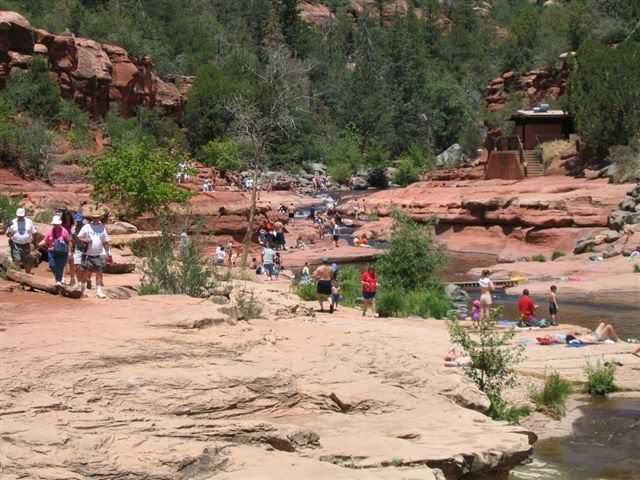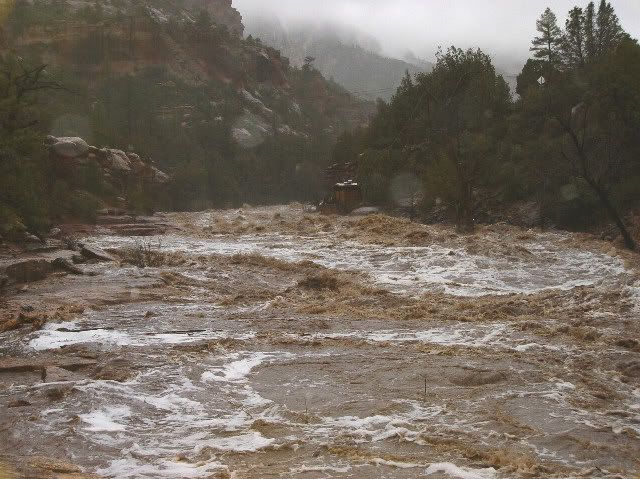For the last year, I have watched in total frustration as Arizona State Parks threaten closure after closure to fix budget problems. This is, of course, when they are not begging for new taxes to be dedicated to them.
For those who don't know, my company is in the business of privatizing public recreation. At the moment, we are so swamped with requests from public authorities to keep parks open that I don't really bother going out and seeking new business. But it is frustrating for me as an Arizona resident to know that many of these parks could remain open (and user fees kept reasonable) under some sort of private concession management.
I know this may seem weird to you given that I work so much with governments, but I have no idea how to lobby government. Unlike, say, John Murtha related enterprises, we get all the business we need simply responding to inquiries from public authorities who need help and submitting proposals in response to RFP's**. In fact, if I had to lobby to keep the business running I would shut it down first.
So I have had no idea how to approach those involved in the Arizona parks debate to tell them there are alternatives. I get frustrated each day as I see folks in the parks organization tell the media that private management would not work because none of their parks would make good business opportunities, when I know for a fact this is not true (I operate stores in two of the parks and am familiar with several others, and have sent them unsolicited management proposals to run these parks -- again, I am not necessarily seeking the business, but I want to give the lie to the statement that private companies would not be interested). Interestingly, two of the largest private recreation managers in the country are located in the Phoenix area, and neither of us have ever gotten a media call on this issue.
Of course, I am not completely naive. I know there is a tried and true kabuki dance here where parks departments threaten to close down the Washington Monument in a bid for public sympathy that will either deflect budget cuts or spur new taxes. I also know that state parks directors have sworn a blood oath together never to let private concessionaires run whole parks, even if the parks have to be shut down (our company runs whole parks for folks like the US Forest Service and TVA, but most state parks only let concessionaires run the store or marina, not the whole park). I know this anti-private law of omerta exists, because our company once sponsored a breakfast at a national state parks directors conference and we were in the room (unknown to the speakers) when this no-private-company discussion was held.
I have called and sent letters to nearly everyone in the state, but have not gotten any response. To assuage my frustration that no one is even reading them, I will reprint one here just to say that someone, even if it is a reader in Australia, actually looked at it:
Janice K. Brewer, Governor; Reese Woodling, Chair, Arizona State Parks Board; Maria Baier, State Lands Commissioner; Rene Bahl, Arizona State Parks Director
Many of the state parks currently proposed for closure could easily be kept open to the public under private concession management. I run one of the larger operators of public recreation concessions in the country, and our company is the current store and marina concessionaire at Patagonia Lake State Park and Slide Rock State Park. I know from experience both with public recreation in general as well as with Arizona State Parks that these parks (as well as many other in the ASP system) could easily be operated by a company like ours, retaining high quality recreation options for the public while converting a liability for the state into a financial asset.
For years we have urged the management of Arizona State Parks to consider private operations of more than just the stores in these parks. For example, we operate whole parks turnkey for the US Forest Service, the National Forest Service, the Tennessee Valley Authority, the United Water Conservation District (CA), and the Lower Colorado River Authority (TX). By operating the park to high quality standards but at a lower cost, we are able to make a profit for ourselves and pay an annual rental fee (usually contracted as a percentage of sales) to the government authority that owns the park.
I find it tremendously frustrating that the private concession option has not even been put on the table for discussion, or gets sloughed off with tired clichés such as "private companies would just put up a McDonalds." When we operate any public park, we operate under a strict and detailed operating agreement, typically running over 100 pages, that sets procedures for everything from bathroom cleaning frequency to approvals for fee changes. We operate busy day use facilities such as Grasshopper Point and Crescent Moon along Oak Creek in Sedona side by side with Arizona State Parks at Slide Rock, and we maintain these facilities in at least as good a condition, while keeping fees to $8 (vs. $20 at Slide Rock) and still paying rent to the USFS for the concession.
I am not looking for any special consideration for our company. I know such contracts must be competitively bid and we don't shy away from such competition. However, I know that the management of Arizona State Parks has, for whatever reason, been resistant to the idea of private concession operations of entire parks, and I was afraid that this option may not have been presented to you as a viable alternative to closing these facilities.
I would be happy to discuss private concession management any time with you or your staff.
Sincerely,
Warren Meyer
President
Postscript: Interestingly, the most open state parks director to these ideas was Ruth Coleman in California. Contrary to what one might expect, California State Parks is actually one of the more innovative and creative parks organizations out there in terms of privatizing certain functions and seeking private capital (Texas, on the other hand, is one of the worst -- go figure).
Ms. Coleman was very supportive of our making investments in California Parks (example: Cabins here) where no other park system has been so open. She was nice enough to allow our company to sit on a panel of folks looking at potential solutions to the California Parks budget issues. But her organization was openly hostile to any private participation, and essentially said they would rather see parks closed than remain open under private management. For example, here was probably the most supportive comment we got: "Well, I guess I could accept some private companies in the parks as long as we didn't allow them to make a profit." Again, that was the least hostile statement.
**Footnote: The typical lifecycle of this business is that a public agency runs to us begging to take something over to keep it open. We do so on a quickly negotiated contract, and then find ourselves spending a ton of money to fix all the deferred maintenance problems left by the public agency. About when we finally get the place cleaned up and public trust restored and finally have the prospect to make a little money at the location, the public agency decides it is time to seek competitive bids. Everyone who refused run the place when it was a mess now come out of the woodwork to bid on running the facility now that its fixed up, several of whom seem to have oddly close relationships with senior officials of the public agency. We bid, some of which we win and some of which we lose. If we win, we get to enjoy the fruits of our labor. If we lose, we shrug and try again.

